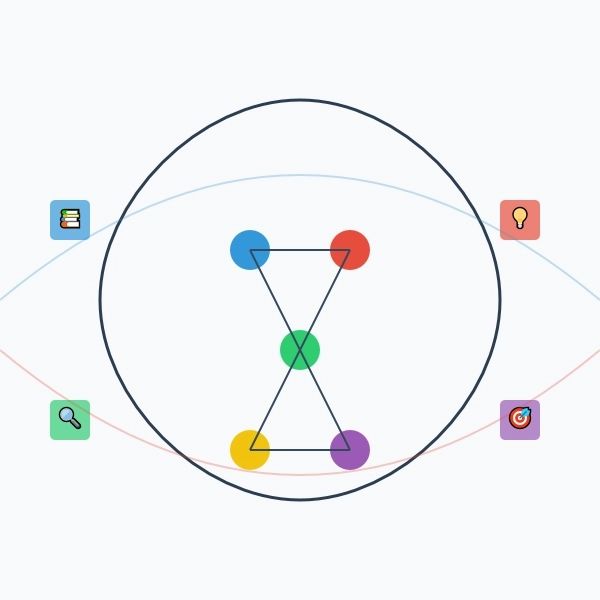Cognitive engagement activities are at the heart of active learning, where the goal is to move beyond passive absorption of information to a psychological state of deep involvement and motivation. These activities encourage learners to not just consume knowledge but to actively engage with it, applying critical thinking and problem-solving skills to real-world problems.
Through a variety of strategies that include behavioural engagement, such as participating in class and completing assignments, learners progress to developing critical engagement. This journey involves emotional, social, and ultimately cognitive engagement, where learners strive to understand complex concepts, challenge themselves beyond the basics, and engage in self-regulated learning.
Exploring the Essence of Cognitive Engagement
Cognitive engagement represents a psychological state where learners are not only motivated but are also committed to understanding and applying new knowledge. It’s a process that begins with the eagerness to learn and extends through active interaction with instructors and peers. The ultimate aim is to foster an environment where learners are developing critical skills for thinking and problem-solving, navigating through challenges with a focus on achieving a deeper understanding of the subject matter.
Theoretical Foundations and Practical Implications
The concept of student cognitive engagement is grounded in a theoretical framework that emphasises active participation in the learning process. This engagement is not just about being physically present in a classroom; it involves mentally investing in learning activities, reflecting on content, and applying knowledge in practical settings.
Behavioural vs Cognitive Engagement: A Comparative Analysis
While behavioural engagement focuses on observable actions such as attendance and task completion, cognitive engagement delves into the internal processes that govern learning. Cognitive engagement is concerned with the mental efforts learners put into understanding and mastering new concepts, differentiating it from the mere physical or outward signs of engagement seen in behavioural participation.
Strategies to Foster Cognitive Engagement
Enhancing cognitive engagement requires a blend of engagement strategies that captivate students’ interests and stimulate their minds. Teachers play a crucial role in designing activities that challenge students and encourage them to think deeply and critically about subject matters.
Innovative Teaching Methods for Enhanced Learning
Adopting innovative teaching strategies and assessments can significantly impact students’ learning experiences. Methods that promote active participation and encourage students to teach what they have learned to others can deepen understanding and retention of knowledge.
Classroom Polling and Response Systems
Classroom polling and response systems are effective tools for increasing participation and gauging understanding in real-time. These technologies provide immediate feedback, allowing teachers to adjust their instructional strategies and students to monitor their own learning progress.
Engaging with Math Quiz Questions and Classroom Games
Integrating math quiz questions and classroom games can make learning more interactive and fun. Such activities promote competition and collaboration among students, enhancing their engagement and motivation to learn complex concepts in an enjoyable manner.
Effective Use of Technology in Cognitive Engagement
Technology plays a pivotal role in facilitating cognitive engagement through various digital tools that make learning interactive and accessible. By leveraging technology, educators can create a dynamic learning environment that caters to diverse learning styles and needs.
Interactive Presentation Techniques and Online Quiz Creators
Interactive presentation techniques and online quiz creators offer innovative ways to engage learners. These tools allow for the creation of dynamic content that encourages active participation, ensuring that learners are not passively receiving information but are actively involved in the learning process.
The Role of AI Presentation Makers and Classroom Engagement Strategies
AI presentation makers and sophisticated classroom engagement strategies are transforming the educational landscape. These technologies provide personalised learning experiences, making it easier for educators to capture students’ attention and foster a more engaging learning environment.
Cognitive Engagement in Different Contexts
Cognitive engagement is crucial not only in educational settings but also in the workplace, where it can lead to improved performance and innovation. Understanding and promoting cognitive engagement across different contexts can enhance learning and productivity.
Cognitive Engagement at Work
In the workplace, cognitive engagement is about creating a culture where employees are motivated to challenge themselves and actively contribute to their team’s success. This involves providing opportunities for learning and growth, which can lead to higher job satisfaction and better outcomes.
Corporate Event Ideas and Leadership Training Topics
Corporate events and leadership training are excellent opportunities to promote cognitive engagement among employees. By focusing on interactive and thought-provoking topics, organizations can stimulate intellectual curiosity and encourage continuous learning and development.
Team Building Activities and Icebreaker Games for Work
Team building activities and icebreaker games play a vital role in fostering cognitive engagement at work. These activities not only bring employees together but also challenge them to think creatively and collaborate more effectively, leading to a more cohesive and innovative workplace.
Cognitive Engagement in Education
Cognitive engagement in education is pivotal for fostering a learning environment where students are not only attentive but also actively involved in their learning processes. This engagement is achieved when students are motivated, willing to grasp new knowledge, apply it, and take on challenges beyond their requirements. Through emotional, behavioral, social, and cognitive engagement, students develop critical thinking and problem-solving skills, which are essential for their academic success and personal growth.
Icebreaker Games for Students and Online Debate Games
Icebreaker games for students and online debate games play a significant role in enhancing cognitive engagement by encouraging students to express their ideas, think critically, and interact with their peers. These activities not only make learning more enjoyable but also help in building a sense of community among students. Engaging in online debates, for instance, sharpens students’ argumentation skills and promotes critical thinking, while icebreaker games can reduce anxiety and foster a positive learning atmosphere.
Classroom Engagement Strategies and Top Test Makers for Teachers
Effective classroom engagement strategies and the use of top test makers are essential for teachers aiming to enhance student engagement. By incorporating diverse teaching methods, such as direct instruction, collaborative projects, and hands-on activities, teachers can cater to different student interests and learning styles. Furthermore, leveraging top test makers allows for the creation of customized assessments that are sufficiently challenging, promoting metacognition and helping students develop a deeper understanding of the subject matter.
Measuring and Enhancing Cognitive Engagement
Measuring and enhancing cognitive engagement are critical for understanding how effectively students are interacting with the learning material and identifying areas for improvement. By assessing cognitive engagement, educators can tailor their teaching strategies to better meet the needs of their students, leading to improved academic outcomes and enhanced student engagement. This process involves continuous monitoring and adapting, ensuring that learning activities remain relevant and engaging for all students.
Tools and Techniques for Assessing Engagement
Various tools and techniques are available for assessing engagement, including classroom response systems and polling tools. These technologies provide immediate feedback on students’ understanding, allowing teachers to adjust their teaching in real-time. Furthermore, techniques such as summative assessments and exit tickets can offer insights into students’ cognitive processes, enabling educators to measure the effectiveness of their teaching strategies and make necessary adjustments to enhance cognitive engagement.
Classroom Response Systems and Polling Tools
Classroom response systems and polling tools are invaluable for fostering active participation in classroom settings. These tools enable teachers to gauge students’ understanding of the material instantaneously, facilitating a more interactive and engaging learning experience. By incorporating these technologies, teachers can create a dynamic classroom environment where every student’s voice is heard, and learning becomes a more collaborative process.
Analytics and Feedback Mechanisms for Continuous Improvement
Analytics and feedback mechanisms play a crucial role in the continuous improvement of teaching strategies and student learning outcomes. By analyzing data on students’ performance and engagement levels, educators can identify patterns and areas for enhancement. This information allows for the implementation of targeted interventions to address specific challenges, thereby improving the overall effectiveness of the learning environment and enhancing cognitive engagement.
The Last Word on Cognitive Engagement Activities
The implementation of cognitive engagement activities marks a transformative approach to learning and teaching. By prioritizing activities that stimulate students’ cognitive processes, educators can foster environments where learners are actively engaged, motivated, and equipped with critical thinking and problem-solving skills. This shift not only enhances academic performance but also prepares students for the complexities of the 21st century, making cognitive engagement an indispensable element of modern education.
The Transformative Power of Engaging Cognitively in Learning and Work Environments
The transformative power of engaging cognitively in learning and work environments cannot be overstated. When individuals are cognitively engaged, they are more likely to exhibit intrinsic motivation, participate actively, and demonstrate improved problem-solving skills. This psychological state enhances both educational and professional settings, leading to more effective learning, higher productivity, and greater satisfaction. Ultimately, cognitive engagement lays the foundation for lifelong learning and success.
Key Takeaways and Future Directions in Cognitive Engagement Activities
The key takeaways from exploring cognitive engagement activities highlight the critical role of active learning strategies in promoting students’ cognitive abilities and critical awareness. As education continues to evolve, the focus on enhancing cognitive engagement through innovative teaching methods, technology integration, and personalized learning experiences will become increasingly important. Looking forward, educators and researchers must continue to explore and implement strategies that not only engage students cognitively but also prepare them for the challenges and opportunities of the future.






